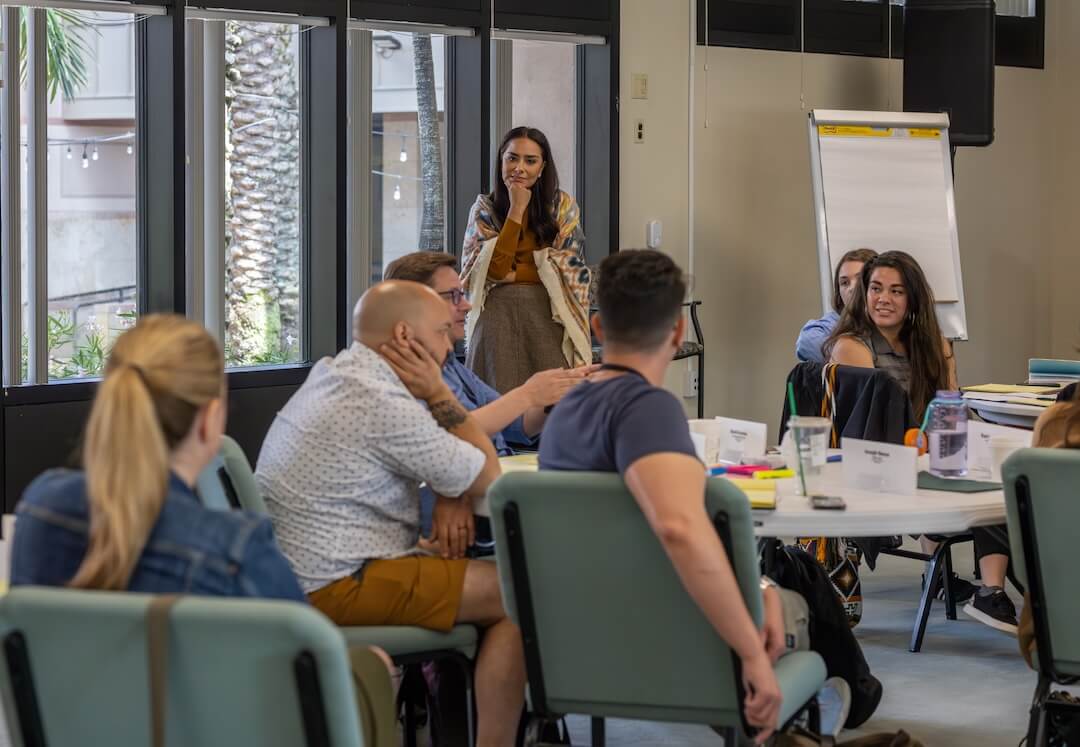One thing many journalism researchers don’t do well is to make their work applicable for working journalists. And one thing working journalists don’t do well, maybe understandably, is apply the researchers’ studies to their journalism.
This dynamic makes sense, I suppose, if the research doesn’t reflect or address how journalists actually work, but it’s sad, because journalists and academics often have the same thing in mind — making journalism better. That aim and applicability is right there in the research for journalists to consider.
Complaints about the town-and-gown divide in higher education and specifically in journalism research are long-standing. As the idea that journalists and professors don’t need each other becomes embedded into new journalists — and into new professors — the philosophy of staying apart becomes long-lasting.
Recently, I have been working on a book review of “Where Ideas Go to Die: The Fate of Intellect in American Journalism,” which focuses on how journalists are skeptical of and sometimes deride intellectualism that comes from academics. I was reminded of my time as a reporter when I had to call academics for comment on everything from U.S. military action in Afghanistan and race relations in my city to economic trends and new technological innovations.
Many times, the call would go well and the quotes from the scholar would provide context to the story, but just as often the inclusion of an academic seemed merely a way to get “another voice” or “perspective,” to reduce any accusations of bias in our reporting, and to attempt meeting the unreachable notion of objectivity.
My academic sources were always smart, to be sure, but their perspectives on everyday issues sometimes felt forced to fit those of my audience and were distant in meaning from the issues and lived experiences I was writing about. (Ironically, and for transparency, I am sometimes that academic source myself and try to make connections from the ivory tower to the real world — terms I actually reject — quite clear and concise.)
But I’m also aware that sometimes a professor-reporter divide exists because academics and their suggestions on how journalists should work are aligned with the academic’s own ideology on social policy or with an interest to gain a track record in media that can help with promotion cases and further their reputation.
Also, the prof might just not have been in a newsroom in a while — or a long while — and their tips of the trade are outdated. I’m not ignorant of our general track record for being wrong in our assessments and predictions of the future, as Victor Navasky, who chairs the Columbia Journalism Review, records in his co-authored “The Experts Speak: The Definitive Compendium of Authoritative Misinformation.” There, he and Christopher Cerf list generations of “experts” for journalists and citizens who got their predictions and assessments wrong, including on the strength of the stock market that led to the Great Depression and that the television would be a financial flop, according to one New York Times source in 1926.
But those scholars in error were the exception, and most that I know want to help make a difference in journalism. At Journalism Practice, therefore, we’ve developed a new podcast, The J Word, to connect journalists and scholars around discussions about what’s happening in newsrooms across the globe.
We are joining a variety of interesting journalism-related podcasts that have gained traction, including:
- Journalism History, from the Association for Education in Journalism and Mass Communication’s Journalism History Division. This podcast features a range of hosts who study connections between journalism of yesterday and contemporary times.
- BuzzMachine features videos and posts by scholar and journalism innovator Jeff Jarvis. Less a true-to-form podcast, the site features a balance of insights through video and text about daily, digital journalism and social issues.
- #Deuzevlog is a vlog by scholar Mark Deuze who features discussions with leading journalism researchers to comment on and provide solutions for everyday social and cultural challenges in news work.
Our podcast at Journalism Practice is available on Spotify, Apple and Google Podcasts, iHeart Radio, and other platforms. It not only offers interviews about technology in the newsroom, race, global trends in journalistic practice related to trust and gender and covering sexual violence and politics, but provides temporary free access to the articles that are discussed during the podcast to get around paywalls. (For those who are really interested and can’t find articles online once access is closed, feel free to email us at jwordpodcast@gmail.com.)
Our podcast comes amid a (re)rise of podcast popularity, largely following the success of National Public Radio’s Serial (now owned by The New York Times). It has emerged alongside the resurgence of e-newsletters, including – for journalism scholars — RQ1, which each month locates and truncates new journalism studies papers.
It may take more than our podcasts and push notifications about newsletters to bridge the journalism research-practice divide, but we think this (and these other resources) are a good start.
Robert Gutsche, Jr. (www.robertgutschejr.com) is the senior lecturer in critical digital media practice in the Department of Sociology at Lancaster University in the United Kingdom.
Episode 1: Solution Journalism and Participation, July 13
Episode 2: Covering Race, Protest, and Trump’s “Carnival,” July 27
Episode 3: The Ins and Outs of AI in Global Newsrooms, Aug. 19
Episode 4: Getting Back the Opted-Out Digital Audience, Sept. 23
Episode 5: Trust, Audiences, and Solutions Part 1, Oct. 7
Episode 6: Trust, Audiences, and Solutions Part 2, Oct. 21
Episode 7: Can News Stop Sexual Violence?, Nov. 4
Episode 8: How to Stay in (or Leave) Journalism, Nov. 18
Episode 9: Global Issues in Digital Journalism, Dec. 2
Episode 10: Recovering from Elections: International Perspectives, Dec. 16






